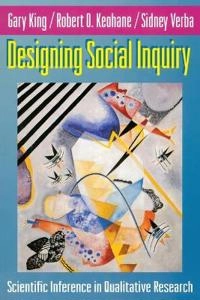

Designing social inquiry : scientific inference in qualitative researchUpplaga 2
- Upplaga: 2a upplagan
- Utgiven: 1994
- ISBN: 9780691034713
- Sidor: 264 st
- Förlag: Princeton, N.J. Princeton University Press
- Format: Häftad
- Språk: Engelska
Om boken
Åtkomstkoder och digitalt tilläggsmaterial garanteras inte med begagnade böcker
Mer om Designing social inquiry : scientific inference in qualitative research (1994)
1994 släpptes boken Designing social inquiry : scientific inference in qualitative research skriven av Gary King. Det är den 2a upplagan av kursboken. Den är skriven på engelska och består av 264 sidor. Förlaget bakom boken är Princeton, N.J. Princeton University Press.
Köp boken Designing social inquiry : scientific inference in qualitative research på Studentapan och spara pengar.
Referera till Designing social inquiry : scientific inference in qualitative research (Upplaga 2)
Harvard
Oxford
APA
Vancouver



















